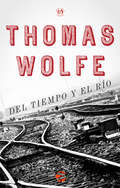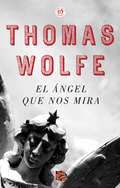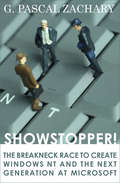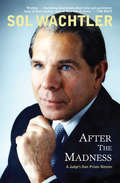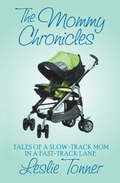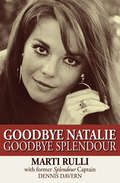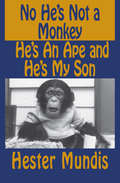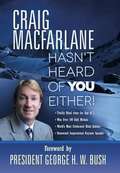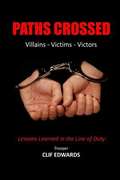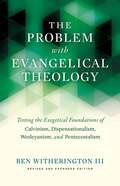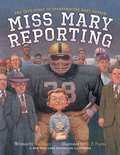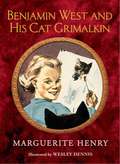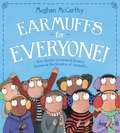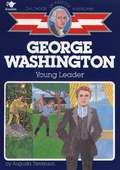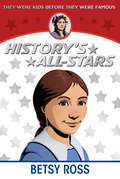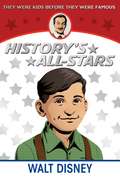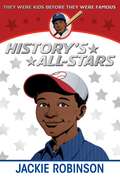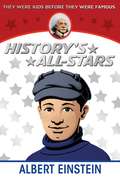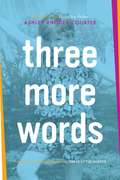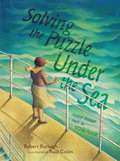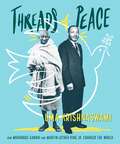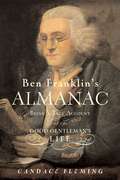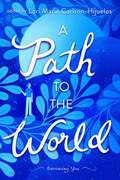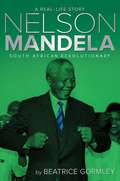- Table View
- List View
Del tiempo y el río
by Thomas Wolfe Maruja Gómez SegalésEugene se embarca en un viaje hacia el Norte. Después de haber dejado la universidad en su estado natal, está convencido de que se ha convertido en testigo y repositorio de una vasta y panorámica serie de imágenes que, en conjunto, revelan las innumerables caras de América.Con el avance del viaje, lo embarga una sensación de huida del misterio oscuro y lúgubre del Sur hacia la libertad y la promesa luminosa del Norte, con sus ciudades brillantes y sus esperanzas extravagantes. Las llanuras, los picos y los valles que conforman el paisaje sobre el que pasa, así como los innumerables pueblos y ciudades a lo largo del camino, nos hablan a través de Eugene de la diversidad ilimitada de los Estados Unidos.
El ángel que nos mira
by Thomas Wolfe José Ferrer AleuWilliam Oliver Gant, cuyos antepasados ??se habían asentado en Pennsylvania, había sido aprendiz de cantero. Se trasladó finalmente al Sur y, después de dos matrimonios, llegó a Altamont, pequeña ciudad de montaña que es el equivalente ficcional del Asheville natal del autor. Allí conoció a Eliza Pentland, que venía de una establecida y excéntrica familia de esa región.Después de un noviazgo formal se casó con ella. Incluso entonces, Gant era un hombre salvaje y exuberante, capaz de borracheras épicas y dueño de una vitalidad indomable. A finales del siglo XIX, con más de 50 años, concibió su último hijo. Con esta introducción extraña y retrospectiva se establecen las circunstancias de los primeros años de Eugene Grant y los eventos de su primera infancia se graban y cuentan extensamente.
Showstopper!: The Breakneck Race to Create Windows NT and the Next Generation at Microsoft
by G. Pascal ZacharyThis &“inside account captures the energy—and the madness—of the software giant&’s race to develop a critical new program. . . . Gripping&” (Fortune Magazine).Showstopper is the dramatic, inside story of the creation of Windows NT, told by Wall Street Journal reporter G. Pascal Zachary. Driven by the legendary David Cutler, a picked band of software engineers sacrifices almost everything in their lives to build a new, stable, operating system aimed at giving Microsoft a platform for growth through the next decade of development in the computing business. Comparable in many ways to the Pulitzer Prize–winning book The Soul of a New Machine by Tracy Kidder, Showstopper gets deep inside the process of software development, the lives and motivations of coders and the pressure to succeed coupled with the drive for originality and perfection that can pull a diverse team together to create a program consisting of many hundreds of thousands of lines of code.
After the Madness: A Judge's Own Prison Memoir
by Sol WachtlerDriving down the Long Island Expressway in November of 1992, Sol Wachtler was New York&’s chief judge and heir apparent to the New York governorship. Suddenly, three van loads of FBI agents swerved in front of him—bringing his car and his legal career to a halt. Wachtler's subsequent arrest, conviction, and incarceration for harassing his longtime lover precipitated a media feeding frenzy, revealing to the world his struggles with romantic attachment, manic depression, and drug abuse.In this, his prison diary, Wachtler reveals the stark reality behind his vertiginous fall from the heights of the legal establishment to the underbelly of the criminal justice system. Sentenced to a medium security prison in Butner, North Carolina, Wachtler is stabbed by an unseen assailant, berated by prison guards, and repeatedly placed in solitary confinement with no explanation. Moreover, as a prisoner he confronts firsthand the inequities of a system his judicial rulings helped to construct and befriends the type of people he once sentenced.With unflinching honesty, Wachtler draws on his unique experience of living life on both sides of the bench to paint a chilling portrait of prison life interwoven with a no‑holds‑barred analysis of the shortcomings of the American legal justice system.
The Mommy Chronicles: Tales of a Slow-Track Mom in a Fast-Track Lane
by Leslie TonnerFollow the adventures of Charlie, an urban three-year-old on the fast track, and his slow-track mommy. In this hilarious volume, Charlie gets a haircut like Sting&’s, runs up a tab at a baseball game, and prefers the garlic press to any of his expensive &“educational&” toys. Charlie is a kid learning to be a consumer. His mommy reveals important secrets, like which stroller is &“in,&” which is the &“right&” playgroup, and how to throw a fabulous fourth birthday party. Moms and dads alike will find these anecdotes of parenting at the end of the century to be truly priceless.
Goodbye Natalie, Goodbye Splendour
by Dennis Davern Marti RulliThe shocking true crime story of a beloved Hollywood star gone too soon—told by the captain of the boat on which Natalie Wood spent her last night. Goodbye Natalie, Goodbye Splendour is the long‑awaited, detailed account of events that led to the mysterious death of Hollywood legend Natalie Wood off the coast of Catalina Island on November 28, 1981. It is a story told by a haunted witness to that fateful evening: Dennis Davern, the young captain of Splendour, the yacht belonging to Wood and husband Robert Wagner. Davern initially backed up Wagner&’s version of that evening&’s events through a signed statement prepared by attorneys. But Davern&’s guilt over failing Natalie tormented him. Davern reached out to his old friend Marti Rulli, and little by little, at his own emotional pace, he revealed the details of his years in Wood&’s employ, of the fateful weekend that Natalie died, and of the events following her death that prevented him from telling the whole story—until now.
No He's Not a Monkey, He's an Ape and He's My Son
by Hester MundisMeet Boris, the chimp who took a bite out of the Big Apple—and wished it had been a banana: &“No one concerned with either apes or people should miss it.&” —Peter S. Beagle, award-winning author of The Last Unicorn This book answers the question that is on everybody&’s mind: &“What&’s it like to raise a chimpanzee in Manhattan?&” Hester Mundis&’s hilarious memoir No He&’s Not a Monkey, He&’s an Ape and He&’s My Son is the complete guide to raising a chimp in the heart of urban America. Join Hester, her husband, their terrifying attack dog Ahab, and the funniest monkey—excuse us, ape—ever to occupy an apartment on the Upper West Side of New York City in this true adventure of woman versus beast.
No He's Not a Monkey, He's an Ape and He's My Son
by Hester MundisMeet Boris, the chimp who took a bite out of the Big Apple—and wished it had been a banana: &“No one concerned with either apes or people should miss it.&” —Peter S. Beagle, award-winning author of The Last Unicorn This book answers the question that is on everybody&’s mind: &“What&’s it like to raise a chimpanzee in Manhattan?&” Hester Mundis&’s hilarious memoir No He&’s Not a Monkey, He&’s an Ape and He&’s My Son is the complete guide to raising a chimp in the heart of urban America. Join Hester, her husband, their terrifying attack dog Ahab, and the funniest monkey—excuse us, ape—ever to occupy an apartment on the Upper West Side of New York City in this true adventure of woman versus beast.
Craig Macfarlane Hasn't Heard Of You Either!
by Craig Macfarlane<P>In the pages of this book Craig MacFarlane tells a remarkable story and shares the incredible lessons his experience taught him. Craig takes the amazing story of his success and uses it as a backdrop to demonstrate the framework that has led to a successful, enviable life. <P> To appreciate this book, you need to understand that Craig MacFarlane is totally blind. <P>The victim of a horrible tragedy at the age of two that cost him his eyesight, Craig has forged an awesome life. Treating his total loss of eyesight as nothing more than a minor inconvenience, Craig proceeded to become the World's Most Celebrated Totally Blind Athlete, using his athletic opportunities as the vehicle to establish himself in the "sighted" world and as the launching pad for an impressive 30 year career in the world of business. In his trademark modest and self-effacing style, Craig has written an autobiography that isn't so much about him as it is about you. <P>The stories of Craig's accomplishments, which include winning more than 100 gold medals (the majority against sighted competition) to winning multiple National Championships in both Canada and the United States, to representing Canada and the United States and winning on the World stage, to winning the U. S. National Blind Snow Skiing Championship to Water Ski Jumping at Cypress Gardens to shooting 91 in golf, only serve as the backdrop for a greater message as Craig shares the lessons he learned and how he applied them. <P>Those lessons, those principles, became the foundation that led to his noteworthy career as an internationally renowned Keynote Inspirational Speaker. From the big stage of the Republican National Convention to innumerable international Fortune 100 and Fortune 500 business conferences and conventions to almost 3,000 high schools on three continents, Craig has demonstrated the principles he will challenge you to incorporate into your life. Success, of course, is a highly personal thing and to Craig that also includes being the best husband, father and friend he can be. <P>You will quickly realize that the same principles and lessons that lead to business success also lead to a great life and Craig's world personifies this message every day. The stories in this book will enthrall you. They will grip you. They will entertain you. They will tug at your heartstrings and make you laugh while holding you on the edge of your seat. Even more, they will test you. The stories are real, they are dramatic, they are genuine. The lessons they teach are powerful, significant and potentially life changing, for those who take them seriously. Prepare to be entertained and enlightened as you enjoy this awesome experience. You are about to see the principles of success in a whole new light. You will find yourself inspired to raise the bar in your life and do more with the opportunities in front of you with greater appreciation of what you already have. Don't study this book, enjoy it. <P>Immerse yourself in the spirit of Craig's message and he will truly elevate your senses, taking you from having eyesight to having vision. Ultimately, Craig's message will teach you how to benefit from the profound wisdom that comes from true self awareness, or as he calls, Inner Vision.
Paths Crossed: Villains - Victims - Victors
by Clif Edwards"When I was only fifteen, a thirty-five year old Deputy Sheriff, married and the father of three daughters, was transporting inmates to a dentist when he was overpowered and killed by a prisoner, who then escaped. Thirteen years later, that murderer and my Paths Crossed. " ~ Clif Edwards Paths Crossed of Villains, Victims & Victors by Michigan State Police Detective Lieutenant Clif Edwards is a true dramatic narrative of everyday heroes and crime drama. It reveals a police officer's evolution from rookie to veteran and its impact, both professionally and personally. Told in a highly inspirational manner, appealing to the general public and its insight to a law enforcement career makes it suggested reading for all criminal justice students. Intended as the first in a trilogy, it is crafted in 76 chapters which follow an orderly theme. Every chapter stands alone as a short story coupled with lessons learned, although many are enriched by prior episodes. Chapters are accented with pictures, articles, documents and quotes. Intriguing, sometimes shocking and always inspiring, it is a must read for all served by law enforcement. These stories allow the reader to experience perseverance, mistake and sacrifice. Foremost, the stark, yet precious reality of law enforcement is made real.
The Problem With Evangelical Theology: Testing the Exegetical Foundations of Calvinism, Dispensationalism, Wesleyanism, and Pentecostalism
by Ben WitheringtonThere is no doubting the legacy of Protestant Reformers and their successors. Luther, Calvin, and Wesley not only spawned specific denominational traditions, but their writings have been instrumental in forging a broadly embraced evangelical theology as well. Ben Witherington wrestles with some of the big ideas of these major traditional theological systems (sin, God’s sovereignty, prophecy, grace, and the Holy Spirit), asking tough questions about their biblical foundations. Advocating a return to Protestantism’s sola scriptura roots, Witherington argues that evangelicalism sometimes wrongly assumes a biblical warrant for some of its more popular beliefs. <p><p> Witherington pushes the reader to engage the larger story and plot of the Bible in order to understand the crucial theological elements of Protestant belief. The Problem with Evangelical Theology casts today’s evangelical belief and practice―be it Calvinistic, Wesleyan, Dispensational, or Pentecostal―in the light of its scriptural origins. Witherington offers a comprehensive description of evangelical theology while concurrently providing an insistent corrective to its departures from both tradition and text.
Miss Mary Reporting: The True Story of Sportswriter Mary Garber
by Sue Macy C. F. PayneFrom beloved author Sue Macy comes an illustrated biography of Mary Garber, one of the first female sports journalists in American history! <p><p> While sitting in the bleachers of a Soap Box Derby in the 1950s, Mary Garber overheard two African-American boys in the following exchange: “See that lady down there?” asked one boy. “That’s Mary Garber. She doesn’t care who you are, but if you do something good, she’ll write about you.” <p> Mary Garber was a pioneering sports journalist in a time where women were rarely a part of the newspaper business. Women weren’t even allowed to sit in the press boxes at sporting events, so Mary was forced to sit with the coaches’ wives. But that didn’t stop her. <p> In a time when African-American sports were not routinely covered, Mary went to the games and wrote about them. Garber was a sportswriter for fifty-six years and was the first woman to receive the Associated Press Sports Editors’ Red Smith Award, presented for major contributions in sports journalism. And now, every year the Association of Women in Sports Media presents the Mary Garber Pioneer Award in her honor to a role model for women in sports media. <p> Sure to inspire future journalists, athletes, and any child who has a dream, this illustrated biography of Mary Garber captures her feisty and determined spirit and brings her story to life.
Benjamin West and His Cat Grimalkin
by Marguerite HenryNewbery Award–winning author Marguerite Henry&’s beloved novel about a boy who would do anything to paint is now available in a collectible hardcover gift edition.Benjamin West was born with an extraordinary gift—the gift of creating paintings of people, animals, and landscapes so true to life they “took one’s breath away.” But Benjamin is part of a deeply religious Quaker family, and Quaker beliefs forbid the creation of images. Because Benjamin’s family didn’t approve of his art, he had to make his own painting supplies. The local Native Americans taught him how to mix paints from earth, clay, and plants. And his cat, Grimalkin, sacrificed hair from his tail for Ben’s brushes. This classic story from Newbery Award–winning author Marguerite Henry features the original text and illustrations in a gorgeous collectible hardcover edition.
Earmuffs for Everyone!: How Chester Greenwood Became Known as the Inventor of Earmuffs
by Meghan McCarthyWhen your ears are cold, you can wear earmuffs, but that wasn’t true for Chester Greenwood back in 1873. Earmuffs didn’t exist yet! But during yet another long and cold Maine winter, Chester decided to do something about his freezing ears, and he designed the first pair of ear protectors (a.k.a. earmuffs) out of wire, beaver fur, and cloth. He received a patent for his design by the time he was nineteen, and within a decade the Chester Greenwood & Company factory was producing and shipping “Champion Ear Protectors” worldwide! But that was just the beginning of Chester’s career as a successful businessman and prolific inventor. In this fun and fact-filled picture book you can find out all about his other clever creations. The Smithsonian has declared Chester Greenwood one of America’s most outstanding inventors. And if you’re ever in Maine on December 21, be sure to don a pair of earmuffs and celebrate Chester Greenwood day!
George Washington
by Augusta Stevenson E. Joseph DreanyGet to know George Washington as a kid and discover what made him the ultimate all-star in American history. <P><P>George Washington was the first President of the United States, the commander-in-chief of the Continental Army during the American Revolutionary War, and one of the Founding Fathers of the United States. But what was he like as a kid? <P><P>In this narrative biography, you'll learn all about George Washington's childhood, from his birth in Virginia on February 22, 1732, to his boyhood on a farm near Fredricksburg and later at Mount Vernon, to his relationship with his older brother, who was like a father to him. Find out what George did for fun--and what prepared him to eventually lead a new nation.
Betsy Ross
by Ann Weil Al FiorentinoExplore the childhood of Betsy Ross and find out why she's an all-star in American history!Betsy Ross is remembered as the maker of the first American flag, which was secretly presented to General George Washington in Philadelphia in 1776. But what was she like as a kid? In this narrative biography, you'll learn all about the childhood of Betsy Ross--from her birth on January 1, 1752, as the eighth of seventeen children, to her Quaker upbringing, to her growing love for sewing and apprenticeship to an upholsterer. Discover how and why Betsy began making flags--and some surprising info about her legendary contribution to America.
Walt Disney
by Marie Hammontree Frank IrvinWalt Disney's imagination made him an all-star in American history, and his childhood is where it all began!Walter Elias "Walt" Disney had a huge impact on the entertainment industry as an animator, film producer, director, screenwriter, voice actor, entrepreneur, philanthropist, and international icon. But what was the original voice of Mickey Mouse like as a kid? In this narrative biography, you'll learn about the childhood of the boy who grew up to win and be nominated for more Academy Awards than anyone else in history!
Jackie Robinson
by Meryl Henderson Herb DunnTHE CHILDHOODS OF FAMOUS AMERICANS SERIES One of the most popular series ever published for young Americans, these classics have been praised alike by parents, teachers, and librarians. With these lively inspiring, fictionalized biographies -- easily read by children of eight and up -- today's youngster is swept right into history. ABIGAIL ADAMS SUSAN B. ANTHONY NEIL ARMSTRONG CRISPUS ATTUCKS CLARA BARTON ELIZABETH BLACKWELL DANIEL BOONE BUFFALO BILL WILL CLARK ROBERTO CLEMENTE DAVY CROCKETT WALT DISNEY THOMAS A. EDISON ALBERT EINSTEIN HENRY FORD BENJAMIN FRANKLIN LOU GEHRIG HARRY HOUDINI LANGSTON HUGHES TOM JEFFERSON HELEN KELLER JOHN FITZGERALD KENNEDY MARTIN LUTHER KING, JR. ROBERT E.LEE MERTWETHER LEWIS ABRAHAM LINCOLN MARY TODD LINCOLN THURGOOD MARSHALL JOHN MUIR ANNIE OAKLEY MOLLY PITCHER POCAHONTAS PAUL REVERE KNUTE ROCKNE ELEANOR ROOSEVELT TEDDY ROOSEVELT BETSY ROSS BABE RUTH SACAGAWEA SITTING BULL JIM THORPE MARK TWAIN GEORGE WASHINGTON MARTHA WASHINGTON WILBUR AND ORVILLE WRIGHT
Albert Einstein
by Marie Hammontree Robert DoremusBefore Albert Einstein was an internationally renowned genius, he was a kid--learn all about his childhood and what makes him an all-star in American history!Albert Einstein is a household name synonymous with genius around the world. His work unlocked mysteries of the universe and also impacted everyday conveniences like remote controls and televisions. And while most are familiar with Einstein's adult wisdom (and wild hair), do you know what he was like as a child? From his passion for music--he played both the violin and the piano--to his early curiosity for understanding the mysteries of science, in this narrative biography you'll learn all about Albert Einstein's childhood and the influences that shaped the life of a remarkable man.
Three More Words
by Ashley Rhodes-CourterIn the sequel to the New York Times bestselling memoir Three Little Words, Ashley Rhodes-Courter expands on life beyond the foster care system, the joys and heartbreak with a family she's created, and her efforts to make peace with her past.Ashley Rhodes-Courter spent a harrowing nine years of her life in fourteen different foster homes. Her memoir, Three Little Words, captivated audiences everywhere and went on to become a New York Times bestseller as well as a movie produced by the team who brought you Twilight. Now Ashley reveals the nuances of life after foster care: College and its assorted hijinks, including meeting "the one." Marriage, which began with a beautiful wedding on a boat that was almost hijacked (literally) by some biological family members. Having kids--from fostering children and the heartbreak of watching them return to destructive environments, to the miraculous joy of blending biological and adopted offspring. Whether she's overcoming self-image issues, responding to calls for her to run for Senate, or dealing with continuing drama from her biological family, Ashley Rhodes-Courter never fails to impress or inspire with her authentic voice and uplifting message.
Solving the Puzzle Under the Sea: Marie Tharp Maps the Ocean Floor
by Robert Burleigh Raúl Colón<p>Filled with gorgeous illustrations by acclaimed artist Raúl Colón, this illustrated biography shares the story of female scientist, Marie Tharp, a pioneering woman scientist and the first person to ever successfully map the ocean floor. <p>Marie Tharp was always fascinated by the ocean. Taught to think big by her father who was a mapmaker, Marie wanted to do something no one had ever done before: map the bottom of the Atlantic Ocean. Was it even possible? Not sure if she would succeed, Marie decided to give it a try. <p>Throughout history, others had tried and failed to measure the depths of the oceans. Sailors lowered weighted ropes to take measurements. Even today, scientists are trying to measure the depth by using echo sounder machines to track how long it would take a sound wave sent from a ship to the sea floor to come back. But for Marie, it was like piecing together an immense jigsaw puzzle. <p>Despite past failures and challenges—sometimes Marie would be turned away from a ship because having a woman on board was “bad luck”—Marie was determined to succeed. And she did, becoming the first person to chart the ocean floor, helping us better understand the planet we call home.</p>
Threads of Peace: How Mohandas Gandhi and Martin Luther King Jr. Changed the World
by Uma KrishnaswamiMahatma Gandhi and Reverend Martin Luther King Jr. both shook, and changed, the world, in their quest for peace among all people, but what threads connected these great activists together in their shared goal of social revolution?A lawyer and activist, tiny of stature with giant ideas, in British-ruled India at the beginning of the 20th century. A minister from Georgia with a thunderous voice and hopes for peace at the height of the civil rights movement in America. Born more than a half-century apart, with seemingly little in common except one shared wish, both would go on to be icons of peaceful resistance and human decency. Both preached love for all human beings, regardless of race or religion. Both believed that freedom and justice were won by not one, but many. Both met their ends in the most unpeaceful of ways—assassination. But what led them down the path of peace? How did their experiences parallel...and diverge? Threads of Peace keenly examines and celebrates these extraordinary activists&’ lives, the threads that connect them, and the threads of peace they laid throughout the world, for us to pick up, and weave together.
Ben Franklin's Almanac
by Candace Fleming"What good shall I do today?" How Ben Franklin answered that question -- through his work as a writer, printer, statesman, and inventor -- forever established him as one of America's greatest figures. On one day in 1729 he published the first edition of the Pennsylvania Gazette; on another day he changed the Declaration of Independence by adding the famous words, "We hold these truths to be self-evident"; and it was all in a day's work when he planted the first willow trees in America. Modeled on his own Poor Richard's Almanack, this unique scrapbook captures Franklin's countless accomplishments. Biography and anecdote, cartoon and etching mesh to create a fascinating portrait of this most fascinating man. Anyone interested in the birth of American democracy...or curious about the rise of the U.S. postal system...or wondering how paper money came to be...or wanting to know how Ben Franklin was part of it all, is sure to pore over Ben Franklin's Almanac.
A Path to the World: Becoming You
by Anna Quindlen Pat Conroy Molly Ivins William Sloane Coffin Mario Cuomo Gary Soto Joseph Bruchac Scott Pitoniak Timothy Egan Ralph Fletcher Alexandra Stoddard Emily Lisker George Washington Alan Ehrenhalt Jeremy Lee Michael J Sandel Lori Marie Carlson-Hijuelos Jacinto Jesús Cardona Shadi Feddin Valerie Gribben Alexandre Hollan Geeta Kothari Yuyi Li Kamaal Majeed Madge McKeithen Nawal Nasrallah Raquel Sentíes David E. Skaggs KellyNoel Waldorf Ying Ying YuA chorus of essays from a variety of voices, backgrounds, and experiences, exploring what it means to be human and true to yourself.What does it mean to be yourself? To be born here or somewhere else? To be from one family instead of another? What does it mean to be human? Collected by Lori Carlson-Hijuelos, A Path to the World showcases essays by a vast variety of luminaries—from Gary Soto to Nawal Nasrallah to Ying Ying Yu, from chefs to artists to teens to philosophers to politicians (keep your eyes peeled for a surprise appearance by George Washington)—all of which speak to the common thread of humanity, the desire to be your truest self, and to belong.Contributors include: Lori Marie Carlson-Hijuelos, Joseph Bruchac, Jacinto Jesús Cardona, William Sloane Coffin, Pat Conroy, Mario Cuomo, Timothy Egan, Alan Ehrenhalt, Shadi Feddin, Ralph Fletcher, Valerie Gribben, Alexandre Hollan, Molly Ivins, Geeta Kothari, Jeremy Lee, Yuyi Li, Emily Lisker, Kamaal Majeed, Madge McKeithen, Nawal Nasrallah, Scott Pitoniak, Anna Quindlen, Michael J. Sandel, Raquel Sentíes, David E. Skaggs, Gary Soto, Alexandra Stoddard, KellyNoel Waldorf, George Washington, and Ying Ying Yu.
Nelson Mandela
by Beatrice GormleyGet a behind-the-scenes glimpse of what it takes to change the world in this comprehensive biography that tells the complete life story of internationally renowned peacemaker Nelson Mandela.Civil rights activist. World leader. Writer. Throughout his life, Nelson Mandela took on many roles, all in the pursuit of peace. Born in 1918 in South Africa, he grew up in a culture of government-enforced racism and became involved in the anti-apartheid movement at a young age. Deeply committed to nonviolent activism, Mandela directed a peaceful campaign against the racist policies of his South African government, and spent twenty-seven years in prison as a result. In the years following his emergence as a free man, he continued his efforts to dismantle the country's apartheid system and was awarded the Nobel Peace Prize alongside South African President F.W. de Klerk. In 1994 he was inaugurated as South Africa's first black president and served until his retirement from active politics in 1999 at the age of eighty-one. He continued to promote global peace until his death in 2013, and his legacy lives on. From Nelson Mandela's childhood to his monumental impact on race relations and nonviolent activism, this comprehensive biography shares the truth about the man behind the iconic smile: his struggles, his triumphs, and the sacrifices along the way.
